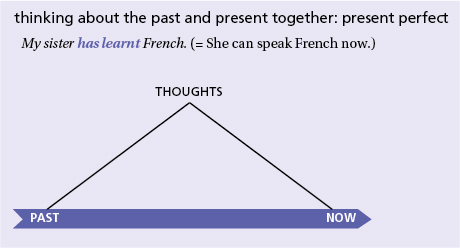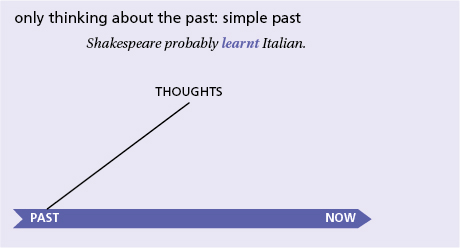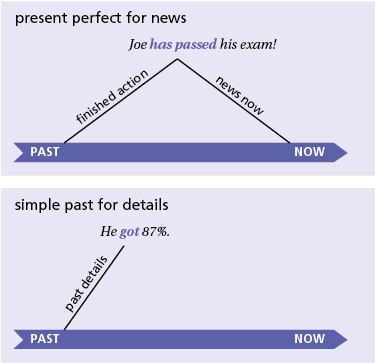Present perfect or past?
Not thinking about the present
We use the present perfect if we are thinking about the past and present together. We do not use the present perfect if we are not thinking about the present. Compare:
- My sister has learnt French. (She can speak French now.)
Shakespeare probably learnt Italian. (notShakespeare has probably learnt Italian.) - We’ve studied enough to pass the exam. (The exam is still to come.)
We studied enough to pass the exam. (The exam is over.) - Anna and Daniel have got married! (news)
My parents got married in Canada.
We do not use the present perfect in story-telling.
- Once upon a time a beautiful princess fell in love with a poor farmer. (not
… has fallen in love …)


Finished-time words: present perfect not used
We do not often use the present perfect with words that refer to a completely finished period of time, like yesterday, last week, then, when, three years ago, in 1970. This is because the present perfect focuses on the present, and words like these focus on the past, so they contradict each other. Compare:
- Have you seen Lucy anywhere?
I saw Lucy yesterday. (notI have seen Lucy yesterday.) - Tom has hurt his leg; he can’t walk.
Tom hurt his leg last week. (notTom has hurt his leg last week.) - What have you done with the car keys? I can’t find them.
What did you do then? (notWhat have you done then?) - My brother has had an accident. He’s in hospital.
When did the accident happen? (notWhen has the accident happened?) - All my friends have moved to London.
Sam moved three years ago. (notSam has moved three years ago.)
But with words that mean ‘at some/any time up to now’ (like ever, before, never, yet, recently, already), we normally use the present perfect (see here).
- Have you ever been to Chicago?
- I’ve seen this film before.
For tenses with just and just now, (see here).
Time not mentioned
We use the present perfect when we are thinking of a period of ‘time up to now’, even if we do not mention it.
- Have you seen ‘Romeo and Juliet’? (=
Have you ever seen it?orHave you seen the present production?) - You’ve done a lot for me. (… up to now)
On the other hand, we do not use the present perfect when we are thinking of a particular finished time, even if we do not mention it.
- Did you see ‘Romeo and Juliet’? (It was on TV last night.)
- My grandfather did a lot for me. (… when he was alive)
News and details
We normally use the present perfect to announce news.
- Have you heard? Andy has won a big prize!
But when we give more details, we usually change to a past tense.
- Joe has passed his exam! He got 87%.
- There has been a plane crash near Bristol. Witnesses say that there was an explosion as the aircraft was taking off, …
- The Prime Minister has had talks with President Kumani. During a three-hour meeting, they discussed the economic situation, and agreed on the need for closer trade links between the two countries.

For more details, exceptions and notes on American usage, (see here).